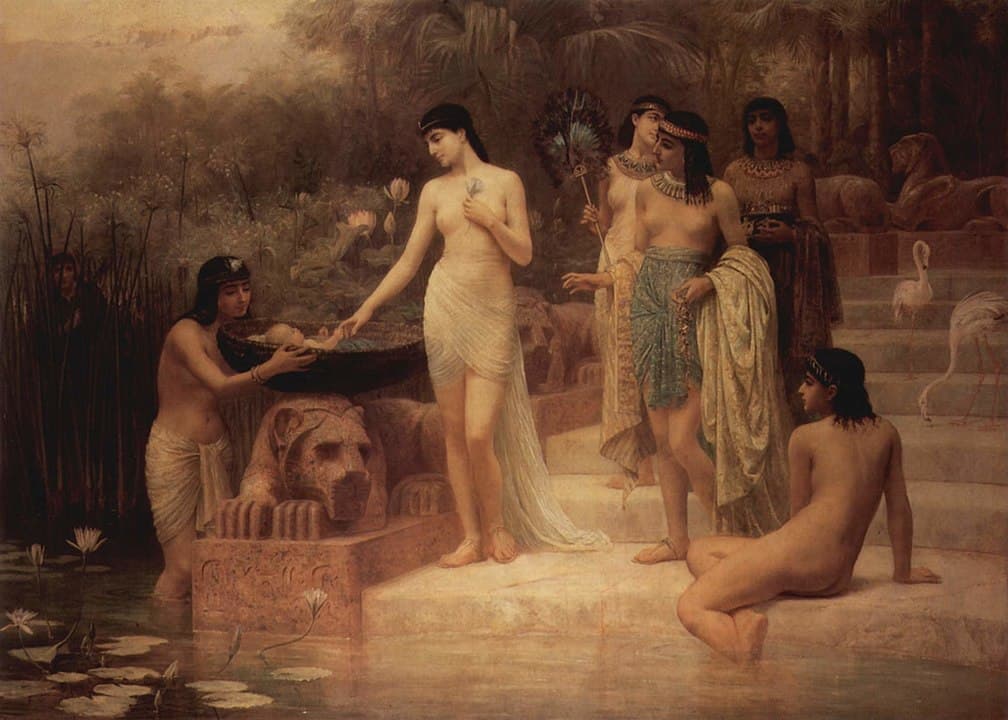
Full Room-Service
The Talmud says that because of the merit of righteous women, the Israelites were redeemed from Egypt (Sotah 11:2). Apparently, the claim that the Rabbis marginalized women or ignored their contribution to society is wrong. But let us read the whole story and see if this is an accurate assessment.
“The Israelites were redeemed from Egypt because of the merit of the righteous women. The women would boil water and fish and take them to their men in the field. They would give them hot baths, anoint them with oil, and feed them the fish. Then they would serve them wine and then lie with them in the field.
When the time came to give birth, they would do it in the field under the apple trees. Angels were sent from heaven to wash and feed the babies.”
Men’s Paradise
Is this a story of brave women leading an underground resistance? The women who will not give up and keep having children? The women who entice their poor, enslaved, and exhausted husbands?
Unfortunately, this is a different story, written by men. For the author of this Midrash, women are an instrument which produces the next generation. Those righteous women march to the fields with luxurious baths and food for the men. They feed and comfort the men, serve them wine, and sleep with them. When the babies are born, they do not distract the women’s attention from their men. There are angel-nannies who take care of them, and the women continue to care for the men. This is not slavery in Egypt, it is men’s paradise!
Army of Babies
How did the righteous women become men-pleasing machines? The original Midrash stated that
The redemption was in the merit of the righteous women. It referred to five specific women who were instrumental, each in her own way, in ushering in the future redemption.
A later author took the story to the realms of myth and fantasy. That was probably necessary after the destruction of the Temple, the fall of Masada, and the failed Bar Kokhva revolt.
The author’s message is that Jews can only defeat the mighty Roman Empire by having more children. And so, the five brave women have turned into servile reproduction machines. It is the kind of “plan” used by poor and oppressed populations as a last resort.
Time to Move On
That message might have served Jews well in the past, but it is not in place today. It is degrading for women, and it minimizes the importance of love and closeness between parents and children. The next generation becomes a weapon against our enemies, an idea associated with fanatic tyrants. We also know that uncontrolled growth is unsustainable, and that family planning is essential for our survival as a species. It is time to bid farewell to the exilic mentality. We are no longer helpless and persecuted whose only strength is being fruitful and multiplying. Judaism has a wonderful system of law and values which can actively make our life and our world better.
Interview with Yokheved
Luckily, I was able to get an exclusive interview with Yokheved, Moshe’s mother. I asked her how she sees the role of righteous women, and whether she is happy with this Midrash.
Yokheved: I am so glad you brought up this question, because I feel that the voice of women is silenced. This legend about women delivering sextuplets and producing an army of 600,000 men stresses me out. My grandchildren started asking me about the fish and water I would serve Amram in the field. Why should children even talk about it? We did not wash and feed the men, and definitely did not sleep with them in the field. Who does that? It’s terrible! But what really bothers me with this story is our image as husband-pleasing, meal-cooking, baby-producing machines. How can we inspire our daughters with such tales? And our future generations, what kind of righteous women will they be?
Defiant Heroes
Yokehevd falls silent for a moment, pensive, then continues: Let me tell you about the true righteous woman! She reveres no one but God, she is strong and unyielding, and she emanates love and compassion. And let me tell you who are the righteous women who brought forth the redemption. They have names!
The first two, the heroes, the role models, are Shifrah and Puah. Ah, such powerful women! It was so easy and convenient to fold under the pressure of Pharaoh. They could kill the babies and say they were just following orders. They risked their lives by defying him. They taught us that we cannot sacrifice others to save ourselves.
Mother, Sister, Princess
When I saw their quiet and resilient victory, I decided to keep my baby against all odds. I looked for a barren Egyptian woman who will adopt a Hebrew infant left on her doorstep. The Hebrew maids in the palace informed me that the princess is a candidate. I put him in a basket and planted it among the reeds near the princess’ favorite bathing spot. My daughter Miriam kept watch, and in her audacity convinced the princess to let me be his wet-nurse.
But all would be for nothing if not for the courage and astuteness of the princess. Pharaoh was enraged when he saw his adopted grandson and wanted to kill him on the spot. The princess played daddy’s little girl very convincingly, threw a tantrum, and then fell quiet and unresponsive. Pharaoh caved in and let her have the baby, and I was the wet-nurse.
Standing with Moshe
Nursing Moshe was telling him stories of our glorious past, of our forefathers, and especially my grandfather Jacob. I fed him stories of the Promised Land and the suffering of his brethren. I told him of the courageous women who risked their lives so he could live. He knew all about the cruel enslavement and was more inspired than anyone to lead the nation to freedom. When he went out that day to see the suffering of his brothers, all of us stood there with him. Shifrah and Puah, Miriam and me, and Pharaoh’s daughter.
Let me tell you this, great women do not stand behind great men. They stand with, in front, or ahead of them. They give them life, love, education, values, and aspiration.
Moshe would not be the great and passionate leader he was without the shield of love of his biological and adoptive mothers. He would not fight with Pharaoh and with God if not for the resilience and courage of Shifra, Puah and Miriam. We shall keep following in the footsteps of those courageous women who defeated the enemy by wit, courage, and faith.
Questions for Kids: Parashat Shemot
- How many people were in Yaakov’s family when the family went to Egypt?
- What was Pharaoh’s decree against בְּנֵי יִשְׂרָאֵל?
- Why did he make such a decree?
- How did בְּנֵי יִשְׂרָאֵל feel in Egypt at that time?
- A baby was born to a family from the house of Levi. What was his mother’s name?
- What was his sister’s name?
- Who saw the baby next to the Nile river?
- What did she name the baby?
- Moshe grew up in Pharaoh’s palace. What did he do when he saw the Egyptian taskmaster beating a Hebrew slave?
- Where did Moshe run away to?
- Who got married to Moshe?
- What is her father’s name?
- In the desert, Moshe saw an amazing sight which drew his attention. What did he see?
- Who spoke to Moshe at that moment, and what did He ask of Moshe?
- Moshe and Aharon were commanded by HaShem to speak to Pharaoh. What did they tell him?
- What was Pharaoh’s answer?
Answer Guide for Parashat Shemot
- 70 people.
- To throw the newborn baby boys to the river.
- He was afraid that בְּנֵי יִשְׂרָאֵל will be so many that they will take over Egypt.
- They were very sad and they cried out to HaShem.
- יוֹכֶבֶד
- מִרְיָם
- בַּת פַּרְעֹה
- מֹשֶׁה
- He killed the Egyptian taskmaster.
- To Midian.
- צִפֹּרָה
- יִתְרוֹ
- He saw a burning bush that was not consumed by the fire – סְנֶה בּוֹעֵר.
- HaShem. He asked Moshe to go to Pharaoh and talk to him.
- שַׁלַּח אֶת עַמִּי
- I do not know who HaShem is and I will not let the people go. Pharaoh even made the people work harder.
Enjoy reading and learning.
Shabbat Shalom


















